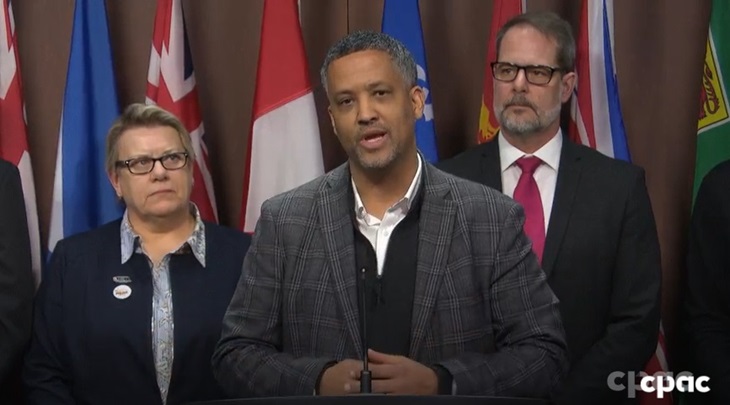
OTTAWA – NDP MPs on Wednesday held a media event in Ottawa to call on the Liberal government to better support telecom workers across the country.
NDP labour critic Alexandre Boulerice (MP for Rosemont—La Petite-Patrie) and NDP deputy labour critic Matthew Green (MP for Hamilton Centre) stood with Donna Hokiro, president of United Steelworkers Local 1944, to call for better protections for jobs in Canada as, they said, big telecom companies continue to cut and offshore Canadian jobs.
The NDP and USW urged the Liberal government to quickly implement the anti-scab legislation tabled by federal Labour Minister Seamus O’Regan on Nov. 9. Legislation to ban replacement workers was one of the demands the NDP made when it entered into a “confidence-and-supply” agreement with the minority Liberal government in March 2022. Under that agreement, the NDP agreed to support the Liberals on confidence and budgetary matters in exchange for government advancement of key NDP policy objectives.
The anti-scab bill seeks to ban the use of replacement workers by companies in federally regulated industries in the event of unionized employees going on strike or being locked out.
Hokiro’s USW local represents nearly 5,700 unionized telecom workers at Telus — which agreed to a labour renewal earlier this year — and other telecom companies including Rogers across Canada, she said during the press conference.
“In just the last year or so we’ve seen Rogers lock out workers in British Columbia. Ironically this came right after their pre-merger public campaign where they bragged about bringing jobs back and investing in Canada. Telus offers severance packages to many members, and most recently to over 4,000 Canadian workers to voluntarily leave their jobs, while they create new jobs overseas. And Bell Canada also had deep cuts,” Hokiro said.
Supported by the NDP MPs, Hokiro proposed three ways the federal government can ensure Canada’s telecom industry is creating and maintaining good jobs in Canada, including having Canadian workers answering calls from customers in their communities.
First, the government can improve and pass its anti-scab legislation, she said, voicing concerns about an anticipated 18-month delay once the legislation is passed before it comes into force. “The historic tabling of government’s anti-scab legislation that the NDP won in their agreement with the Liberals is huge. And we thank the Liberals for coming through. Once this bill gets to committee, we urge that the loopholes that still allow scabs will be closed and the 18-month delay scrapped. Then we need to see the bill passed without delay,” Hokiro said.
Second, the federal government “can use the power of procurement dollars to support good Canadian companies,” she said. “The government spends more than a billion — a billion — dollars a year on phone and internet bills internally. None of that money should go to companies that treat workers poorly or offshore Canadian jobs.”
Finally, the government should make sure only Canadian companies that create and support jobs in Canada get access to spectrum auctions, she said. “The spectrum auction, this is the ultimate carrot for telecom companies, and supporting workers in Canada and creating Canadian jobs should be one of the requirements of having access to any, any more spectrum.”
NDP MP Matthew Green reiterated Hokiro’s concerns about the expected delay in the anti-scab legislation’s implementation.
“We’ve heard today from our friends at USW, I think, a warning that the 18-month time delay for implementation could mean that other locals, other communities, other businesses might decide to use in that time lockouts and strikes, things that create great division within our communities, between workers, pitting worker against worker. This legislation needs to be very clear that 18-month window needs to be shortened, it needs to be implemented without delay.”
Green also echoed Hokiro’s call for the government to use its procurement dollars and regulatory powers to support telecom workers, and ultimately consumers.
“The truth remains that in the government federal coffers, when it comes to procurement, that over the last 15 years, the federal government has handed Canada’s three largest telecoms $20 billion in government procurement contracts. These three large telecoms, this is a cartel taking taxpayer dollars, taxpayer money. We know in covid they took wage subsidies and rent subsidies and then they went ahead and used scab labour. They used replacement workers. This is unconscionable,” Green said.
“We’re here today to close those gaps and…to demand that when the government has the use of tax dollars that it does it in a way that respects collective bargaining rights and the rights of workers, and it doesn’t undermine them by allowing that money to be used with replacement workers,” Green said. “And that when it comes to competition that we do everything within our power to break up those cartels, to use the spectrum, to use the regulatory powers to ensure that at the end-line consumers are getting the highest quality supported by good unionized jobs, to have fair rates at the end of the day.”
Screen capture of (l-r) USW Local 1944 president Donna Hokiro, NDP deputy labour critic Matthew Green and NDP labour critic Alexandre Boulerice at Wednesday’s press conference, via CPAC.


